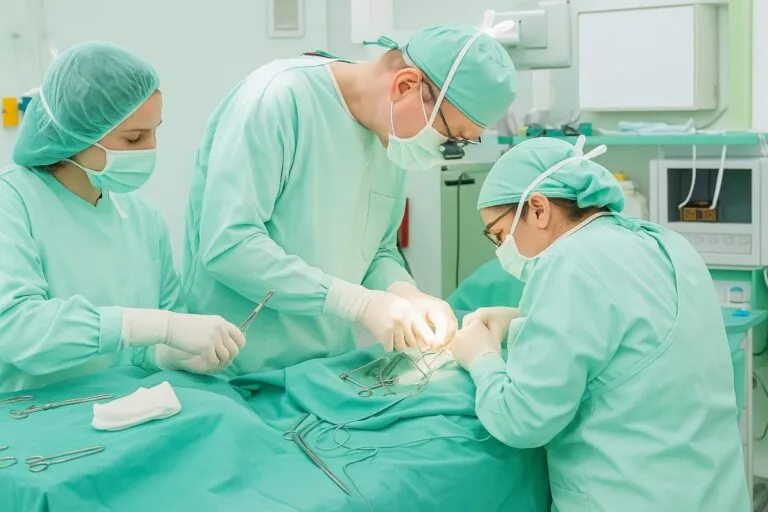At New Life Clinic, the treatment of umbilical hernias is carried out using all known modern methods that ensure high efficiency and safety for our patients. But the main difference between us and other clinics is the unique patented technique of submerged sutures (Invention Patent of Ukraine No. 49856 dated 15.10.2002), which allows not only to restore the normal position of the organs and strengthen the hernial gate, to guarantee the absence of risks of recurrence of the hernia, but also to practically completely eliminate any traces of the operation on the body.

Umbilical Hernia Treatment
Umbilical hernia treatment using minimally invasive techniques with minimal trauma and rapid recovery. We perform surgeries of any complexity with precise monitoring and adherence to clinical protocols.
- Highly qualified surgeons
- Expert-level equipment
- Patented technique
- Transparent surgery cost
Cost of Umbilical Hernia Surgery
Umbilical hernia surgery at New Life Clinic is provided at a fair and transparent price, allowing you to plan your treatment in advance without unexpected expenses. The cost is fixed at every stage and does not include any hidden fees. We clearly explain what is included in the price of the procedure, so you fully understand what you are paying for and which services will be provided.
Hernia Surgical Treatment Expert at New Life Clinic

Hernia removal operations at the “New Life” clinic are performed by a top category herniological surgeon with 39 years of experience in Ukraine and the USA (Loma Linda University Medical Center, California).
David Noga is the founder and chief physician of New Life Clinic, has 22 scientific works, 3 patents for inventions (including one patent of the international PCT standard) and patent rights for 2 useful models in medicine.
Patient Reviews
The language, style and spelling of the authors are preserved
Why Choose Hernia Surgery at New Life Clinic

COMPLEX APPROACH

MAKING THE RIGHT DECISIONS

MINIMALLY INVASIVE

MODERN EQUIPMENT
Herniology Results in Numbers
Treatment of Abdominal Hernia at New Life Clinic – Photo Report
Surgical Treatment of Umbilical Hernia: What Is Important for the Patient
An umbilical hernia often causes uncertainty and many questions, so this block brings together the key information about its causes, typical symptoms, precautions and modern treatment methods. This overview helps patients better understand their condition and prepares them for a consultation with a surgeon.
-
An Umbilical Hernia Never Heals on Its Own
-
There Is No Non-Surgical Treatment for Umbilical Hernia
-
Actions That Can Worsen the Condition
-
Methods of Umbilical Hernia Repair
-
Fast Recovery After Surgery
Common Patient Questions
An umbilical hernia diagnosis often causes anxiety: some patients fear surgery, others worry about recovery, and some hope the problem will resolve on its own. These concerns are natural, but at New Life Clinic our experienced surgeons perform safe and effective procedures that ensure quick recovery and long-term results.
-
Will the Surgery Be Safe? I’m Worried About Possible Complications
-
How Will I Feel After the Surgery? Will It Be Painful?
-
Will I Need to Stay in the Hospital?
-
Can I Be Sure the Hernia Will Not Return?
-
What If I’m Wrong and Surgery Isn’t Really Necessary?
-
What Happens If I Wait and Do Nothing?
-
How Do I Know I’m Choosing the Right Clinic and Surgeon?
-
Will I Be Able to Return to Work and Normal Activities Quickly?
-
Are There Any Hidden Fees? Is the Price Truly Fixed?
Leave a Request – We Will Find a Convenient Time for You
Equipment and Facilities at New Life Clinic
The content on this page has been approved by the surgeon at New Life Clinic (David Noga, an abdominal surgeon with 39 years of practical experience).












































